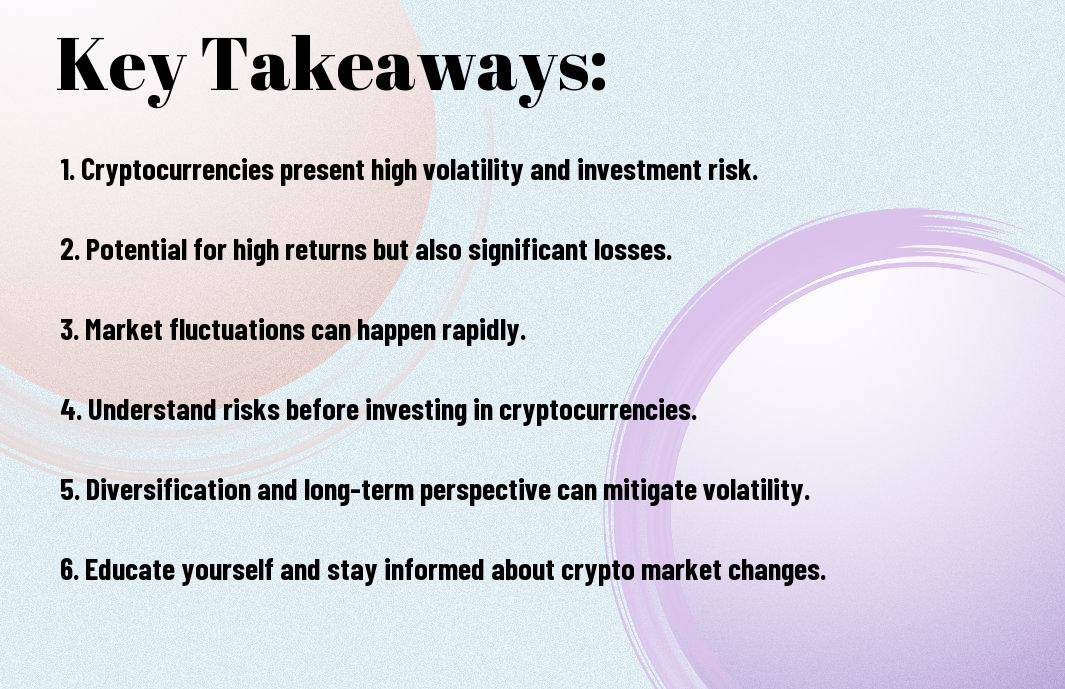Rewards in the world of cryptocurrencies can be enticing, but it is necessary to understand the volatility that comes with it. The cryptocurrency market is known for its unpredictable nature, where prices can fluctuate significantly in a short period of time. While the potential for high returns is appealing, it is crucial to be aware of the risks involved.

Key Takeaways:
- Cryptocurrency Volatility: Cryptocurrencies are known for their high volatility, which can lead to rapid and unpredictable price movements.
- Investment Risk: Investing in cryptocurrencies comes with a high level of risk due to market volatility and regulatory uncertainty.
- Opportunity for High Returns: Despite the risks, cryptocurrencies also present the opportunity for high returns for those willing to accept the volatility.
- Diversification is Key: To mitigate the risks associated with cryptocurrency investments, diversification across different asset classes is crucial.
- Long-Term Perspective: Taking a long-term perspective when investing in cryptocurrencies can help reduce the impact of short-term price fluctuations.
- Stay Informed: Keeping up to date with market news, trends, and regulatory developments is crucial for managing the risks and rewards of cryptocurrencies.
- Seek Professional Advice: For those unfamiliar with the cryptocurrency market, seeking advice from financial professionals or advisors can help navigate the risks and rewards effectively.


Understanding Cryptocurrencies
What Are Cryptocurrencies?
For those new to the world of digital currencies, cryptocurrencies can seem complex and intimidating. In simple terms, cryptocurrencies are digital or virtual currencies that use cryptography for security. They operate independently of a central authority, such as a government or financial institution, making them decentralized and immune to interference or manipulation.
The Blockchain Technology
To understand cryptocurrencies better, it’s crucial to grasp the concept of blockchain technology. The blockchain is a distributed ledger that securely records all transactions across a network of computers. Each block in the chain contains a list of transactions, and once verified, it is added to the chain in a chronological order.
For instance, blockchain technology ensures transparency and security in cryptocurrency transactions by eliminating the need for a trusted third party. It also enables faster and more cost-effective cross-border transactions compared to traditional banking systems.
Types of Cryptocurrencies
Types of cryptocurrencies can vary widely, each with its unique features and use cases. It’s imperative to have a basic understanding of the different types before investing in or using them. Knowing the distinctions between each type can help you make informed decisions and mitigate risks.
| Types of Cryptocurrencies | Description |
| Bitcoin (BTC) | The first and most well-known cryptocurrency, often referred to as digital gold. |
| Ethereum (ETH) | A decentralized platform that enables smart contracts and decentralized applications (DApps). |
| Ripple (XRP) | Designed for secure and instant global financial transactions, mainly used by banks. |
| Litecoin (LTC) | A peer-to-peer cryptocurrency created as a “lighter” version of Bitcoin. |
| Stablecoins | Cryptocurrencies pegged to stable assets like fiat currencies to minimize price volatility. |
Knowing the differences between various cryptocurrencies can help you diversify your investment portfolio and manage risks effectively. It’s important to research and understand the unique features and potential of each type before making any decisions in the volatile cryptocurrency market.
The Allure of Cryptocurrencies
Potential for High Returns
To many investors, the potential for high returns is a major draw of cryptocurrencies. The volatile nature of the market can lead to rapid changes in value, offering the possibility of substantial profits in a relatively short timeframe. However, it’s important to approach these investments with caution, as the same volatility that can bring significant gains can also result in significant losses.
Decentralization and User Autonomy
To understand the allure of cryptocurrencies, one must consider the concept of decentralization and user autonomy. Unlike traditional banking systems where a central authority controls transactions, cryptocurrencies operate on decentralized networks. This means that users have greater control over their funds and can make transactions without the need for intermediaries.
Decentralization empowers individuals to have full ownership and control over their assets, eliminating the need to rely on third parties.
Transparency and Security Features
One of the key advantages of cryptocurrencies is the transparency and security features inherent in their technology. Blockchain, the underlying technology of most cryptocurrencies, ensures that all transactions are recorded on a public ledger that is immutable and transparent. This level of transparency can help prevent fraud and ensure the integrity of the system.
Additionally, the cryptographic features of cryptocurrencies provide a high level of security, making them resistant to hacking and other cyber threats.
Risks Involved with Cryptocurrency Investment
Despite the potential for high returns, investing in cryptocurrencies comes with significant risks. It’s important for individuals to understand these risks before jumping into the market. If you are considering investing in crypto, it’s important to weigh the risks and benefits carefully. You can find more insights about this in the article Should I invest in crypto? | Benefits and risks of …
Market Volatility Explained
One of the biggest risks associated with cryptocurrency investments is market volatility. Cryptocurrencies are known for their price fluctuations, which can sometimes be extreme. Investors should be prepared for sudden and significant changes in the value of their investments.
Regulatory Uncertainties
With the evolving nature of the cryptocurrency landscape, regulatory uncertainties pose a major risk to investors. The lack of consistent regulations across different countries and jurisdictions can lead to uncertainty and affect the value of investments. It’s crucial to stay informed about regulatory developments in the crypto space.
Security Risks: Hacks and Frauds
Any investment in cryptocurrencies is vulnerable to security risks such as hacks and fraudulent activities. The decentralized and digital nature of cryptocurrencies makes them attractive targets for cybercriminals. Investors should take precautions to secure their holdings and be cautious about potential threats in the crypto market.
Issues with Scalability and Technology Dependence
Uncertainties surrounding scalability and reliance on technology are significant risks for cryptocurrency investments. The scalability of blockchain networks and the stability of underlying technologies can impact the functionality and value of various cryptocurrencies. Investors should be aware of these risks and stay updated on technological advancements in the industry.
Environmental Impact of Cryptocurrency Mining
Regulatory concerns regarding the environmental impact of cryptocurrency mining are gaining attention. The energy-intensive process of mining certain cryptocurrencies raises questions about sustainability and carbon footprints. It is important for investors to consider the environmental implications of their crypto investments.
Technology: Despite the risks involved, advances in blockchain technology have the potential to revolutionize various industries. It is important for investors to stay informed and adapt to the changing technological landscape to make informed decisions in the crypto market.
Analyzing Volatility in the Cryptocurrency Market
All The Risks and Rewards of Cryptocurrencies come with a certain level of volatility, and the cryptocurrency market is no exception. Understanding the factors contributing to this volatility, historical price fluctuations, and how it compares to traditional markets can provide valuable insights for investors and enthusiasts alike.
Factors Contributing to Cryptocurrency Volatility
- Market Sentiment: Market sentiment plays a significant role in the volatility of cryptocurrencies. News, social media trends, and investor behavior can all impact the market and create sudden price swings.
- Regulatory Changes: Regulatory changes or announcements from governments around the world can cause uncertainty in the cryptocurrency market, leading to increased volatility.
After considering these factors, investors can make more informed decisions when trading cryptocurrencies.
Historical Price Fluctuations
The historical price fluctuations of cryptocurrencies have been known to be extreme, with some coins experiencing massive price swings in a short period. These fluctuations can be influenced by a variety of factors, including market demand, supply, and external events such as security breaches or regulatory changes. Understanding these past price movements can help investors anticipate potential future trends and adjust their strategies accordingly.
Comparisons with Traditional Markets
| Cryptocurrency Markets | Traditional Markets |
| 24/7 trading, high volatility | Market open and close hours, lower volatility |
| Decentralized, based on technology | Centralized, influenced by economic factors |
Analyzing the differences between cryptocurrency and traditional markets can provide insights into the unique characteristics and risks associated with each. Understanding these distinctions is crucial for investors looking to diversify their portfolios effectively.
Comparisons with Traditional Markets
| Cryptocurrency Markets | Traditional Markets |
| Highly volatile, speculative nature | Stable, long-term investment options |
| Less regulated, susceptible to market manipulation | More regulated, investor protection |
To navigate the volatility in the cryptocurrency market, it is important to stay informed and conduct thorough research before making any investment decisions. Stay alert to market trends, diversify your portfolio, and exercise caution to mitigate risks and maximize potential rewards.
Navigating the Cryptocurrency Market
Now, to be successful in the volatile world of cryptocurrency trading, it is crucial to arm oneself with knowledge. A great starting point is by understanding the crypto-asset phenomenon, its risks and rewards as outlined by the European Central Bank. This article explores into the intricacies of cryptocurrency investments, shedding light on the potential pitfalls and gains that come with this digital asset class.
Conducting Thorough Research
The key to making informed decisions in the cryptocurrency market is thorough research. Understanding the technology behind different cryptocurrencies, their use cases, and the teams driving them is crucial. Investors should also keep an eye on market trends, regulatory developments, and other factors that can impact the value of their investments.
Diversification Strategies
Any seasoned investor will tell you that diversification is a crucial strategy when it comes to managing risk in any investment portfolio. Spreading your investments across different cryptocurrencies can help mitigate the impact of a price drop in any single asset. It’s important to research and choose assets with low correlation to ensure a truly diversified portfolio.
Plus, consider diversifying across different asset classes, such as stocks, bonds, and real estate, to further protect your investment portfolio from cryptocurrency market volatility.
Risk Management Techniques
Diversification is just one aspect of managing risk when it comes to cryptocurrencies. Setting stop-loss orders, regularly reviewing your portfolio, and staying updated on market news are all crucial risk management techniques. It’s crucial to have a clear exit strategy in place to limit potential losses and protect your capital.
Strategies that include proper risk assessment, asset allocation, and periodic portfolio rebalancing can help investors navigate the unpredictable nature of the cryptocurrency market and potentially enhance long-term returns.
The Role of Cryptocurrency Exchanges
Risk management in cryptocurrency trading also involves choosing the right platforms for buying, selling, and storing your digital assets. It is crucial to research and select reputable cryptocurrency exchanges that prioritize security and offer a variety of digital assets for trading. Some exchanges have been subject to hacking and fraud, highlighting the importance of due diligence before entrusting your funds to any platform.
For instance, always use two-factor authentication, keep a majority of your holdings in cold storage, and consider using dedicated hardware wallets for added security measures.

Future Outlook
Technological Advancements and Their Impact
To understand the future outlook of cryptocurrencies, we must first acknowledge the role of technological advancements. Your advancements in blockchain technology, such as scalability solutions and interoperability protocols, are expected to address current limitations and propel cryptocurrencies into mainstream adoption. These developments will likely lead to increased transaction speeds, lower fees, and improved security, making cryptocurrencies more practical for everyday use.
Potential Regulatory Developments
To assess the future viability of cryptocurrencies, we must also consider potential regulatory developments. Developments in regulations can have a significant impact on the market, influencing stability, investor confidence, and overall adoption rates. With increased scrutiny from governments and regulatory bodies, the future of cryptocurrencies may hinge on the ability to strike a balance between innovation and compliance.
With the growing interest in digital assets, policymakers around the world are grappling with how to regulate this emerging market effectively. Regulatory uncertainty remains a key concern for investors and industry players alike, as inconsistent or heavy-handed regulations could stifle innovation and drive investment elsewhere.
Predictions and Expert Opinions
Regulatory clarity is crucial for the long-term success of cryptocurrencies. Experts predict that as regulatory frameworks mature, institutional investment will increase, bringing added liquidity and stability to the market. This shift towards mainstream acceptance will likely lead to a broader range of use cases for cryptocurrencies, solidifying their role in the global economy.
Outlook: While the future of cryptocurrencies holds great promise, it is crucial to acknowledge the challenges ahead. Technological advancements and regulatory developments will play pivotal roles in shaping the industry’s direction. A balanced approach that embraces innovation while ensuring compliance with evolving regulations will be key to realizing the full potential of cryptocurrencies in the years to come.
Conclusion
Following this realistic look at the volatility of cryptocurrencies, it is clear that investing in these digital assets comes with both risks and rewards. The extreme price fluctuations and market unpredictability can lead to significant gains for some investors, but also substantial losses for others. It is necessary for individuals interested in entering the crypto market to be well-informed and prepared for the rollercoaster ride that comes with it.
While the potential for high returns may be enticing, it is crucial to approach cryptocurrency investments with caution and a long-term perspective. Diversifying your portfolio, conducting thorough research, and staying informed about market trends are key strategies for navigating the volatile world of cryptocurrencies. By understanding the risks and rewards involved, investors can make more informed decisions and better position themselves to succeed in this ever-changing market.
FAQ
Q: What are the risks associated with investing in cryptocurrencies?
A: Investing in cryptocurrencies comes with risks such as price volatility, regulatory changes, and cybersecurity threats.
Q: How can I manage the risks of investing in cryptocurrencies?
A: You can manage risks by diversifying your portfolio, conducting thorough research, and staying informed about market trends.
Q: What are the potential rewards of investing in cryptocurrencies?
A: Potential rewards of investing in cryptocurrencies include high returns on investment, decentralized nature, and opportunities for innovation.
Q: How can I determine the right amount to invest in cryptocurrencies?
A: The amount you invest in cryptocurrencies should be based on your risk tolerance, financial goals, and investment horizon.
Q: How can I stay updated on the latest cryptocurrency market trends?
A: You can stay updated by following reputable cryptocurrency news sources, joining online cryptocurrency communities, and attending blockchain conferences.
Q: Are there any regulations in place to protect cryptocurrency investors?
A: Cryptocurrency regulations vary by country, and some governments have implemented measures to protect investors from fraud and ensure market stability.
Q: What should I do if I encounter a cryptocurrency scam or fraud?
A: If you encounter a cryptocurrency scam or fraud, you should report it to the appropriate authorities, seek legal advice, and take steps to protect your investments.



